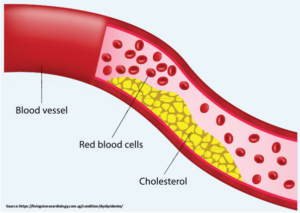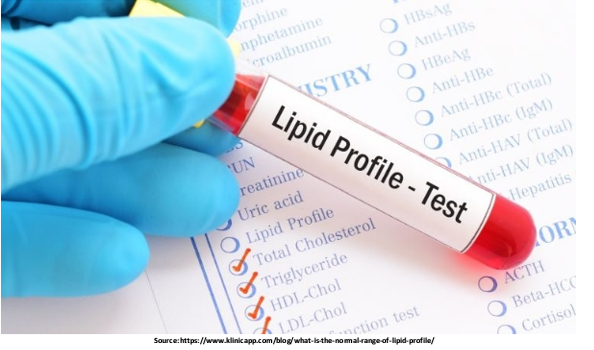Dyslipidemia Treatment in Ghaziabad
Nivaran Health is well-known for effective and result-oriented dyslipidemia treatment in Ghaziabad. Dr. Ayush Chandra, the medical chief of Nivaran Health, specializes in treating dyslipidemia and dyslipidemia-related complications.
Moreover, Dr. Ayush Chandra, a seasoned diabetologist in Ghaziabad, has expertise in treating diabetes, diabetic foot, thyroid disorders, hypertension, etc.
What is Dyslipidemia?
Blood lipids are fatty molecules found in the blood, such as cholesterol and triglycerides. Dyslipidemia is a condition in which a person’s blood lipid levels are abnormally high.
Many people can obtain healthy blood lipid levels by eating a well-balanced diet and implementing lifestyle modifications. However, some people require medicine to prevent further health issues or for dyslipidemia treatment.

Causes of Dyslipidemia
Cholesterol is a waxy chemical produced by our body. It can also be caused by the foods we consume. Cholesterol, saturated fat, and trans fats are all known to raise blood cholesterol levels. These are some of them:
- Cheese
- Egg yolks
- Fried and processed foods
- Ice cream
- Pastries
- Red meat
Avoid over-exercising. It can cause weight gain and elevate cholesterol levels. As we get older, our cholesterol levels are likely to rise as well.
Hyperlipidemia is a condition that can run in families. People who inherit the syndrome are at risk of having extremely high cholesterol levels. Thus, even when they are young, individuals have a substantially higher risk of a heart attack.
Schedule a consultation with Dr. Ayush Chandra to avail of safe and effective dyslipidemia treatment in Ghaziabad.
Symptoms of Dyslipidemia
Unless their dyslipidemia is severe, most people are unaware that they have it. The doctor usually diagnoses dyslipidemia during routine blood tests. The following are some of the most common symptoms:
- Chest pain
- Shortness of breath
- Leg pain
- Dizziness
- Cold sweats
- Jaw, neck, shoulders, and back tightness, pain, and pressure
- Indigestion and heartburn
- Daytime exhaustion and sleep problems
- Heart palpitations
- Nausea and vomiting
- Swelling in the stomach, legs, ankles, feet, and veins of the neck
These symptoms may worsen as a result of physical activity or stress. Consult a doctor if you experience any of these symptoms in addition to chest pain.
Types of Dyslipidemia
Primary and secondary dyslipidemia are the two kinds of dyslipidemia. Secondary dyslipidemia is an acquired ailment caused by diabetes, obesity, and other metabolic diseases, whereas primary dyslipidemia is inherited.
Hyperlipidemia :
Hyperlipidemia and dyslipidemia are often used interchangeably. On the other hand, hyperlipidemia occurs when LDL and triglyceride levels are extremely high, whereas dyslipidemia occurs either high or low.
Primary Dyslipidemia :
Primary dyslipidemia is categorized into three types viz.
- Familial combined hyperlipidemia
- Familial hypercholesterolemia, and polygenic hypercholesterolemia
- Familial hyperapobetalipoproteinemia
Diagnosis And Treatment of Dyslipidemia
- Simple blood tests that contain the complete lipid profile can help detect dyslipidemia. The results confirm whether the LDL, HDL, and triglyceride levels are high, low, or in a healthy range.
- Because the number might fluctuate, it is always better to get the blood work done once a year if the patient is at risk.
- Typically, the doctor will focus on decreasing a patient's triglyceride and LDL levels.
- Treatment options may differ based on the underlying cause of dyslipidemia and the severity of the condition.

- The physician commonly prescribes statins. It is a cholesterol-lowering medication that works by reducing LDL cholesterol synthesis in the liver.
- If statins don't lower LDL and triglyceride levels, the physician may prescribe other drugs, such as:
- Niacin
- Ezetimibe
- Fibrates
- Evolocumab and Alirocumab
- Bile Acid Sequestrants
- Lomitapide and Mipomersen
Some medications and lifestyle changes can assist in promoting healthy blood lipid levels.
Schedule a consultation with Dr. Ayush Chandra to avail of safe and effective dyslipidemia treatment in Ghaziabad.
Prevention of Dyslipidemia
Some of the preventive measures for dyslipidemia are:
- Reduce unhealthy fats in the diet, such as red meat, processed carbs, full-fat dairy products, chocolate, chips, and fried foods.
- Exercise regularly.
- Avoid or limit alcohol intake.
- Maintain healthy body weight.
- Tobacco and smoking cessation.
- Avoid sitting for long periods.
- Increase intake of polyunsaturated fats like those found in seeds, nuts, seafood, legumes, whole grains, and olive oil.
- Take omega-3 fatty acid supplements.
- Consume a high-fibre diet consisting of whole fruits, vegetables, and whole grains.
- Drink sufficient water.
Why Choose Nivaran Health for Dyslipidemia Treatment in Ghaziabad?
- At Nivaran Health, we are dedicated to providing state-of-the-art medical care and evidence-based treatment options.
- We are committed to adding miles to live, bringing a smile to the faces, and giving a pain-free life.
- We offer excellent treatment and care for diabetes, thyroid, hypertension, cholesterol, etc.
- We also provide preventive diagnosis, education, and awareness for our patients.
Schedule a consultation with Dr. Ayush Chandra to avail of safe and effective dyslipidemia treatment in Ghaziabad.
Schedule a consultation with Dr. Ayush Chandra to avail of safe and effective dyslipidemia treatment in Ghaziabad.
Frequently Asked Questions:
Polycystic ovarian syndrome, pregnancy-related high blood pressure, and gestational diabetes are all risk factors for cardiovascular disease-specific to women.
Animal-derived foods, such as egg yolks, fatty meats, poultry, dairy, and ordinary cheese, are high in dietary cholesterol.
False. High cholesterol levels can affect people of any age. Cholesterol accumulation in arteries has been proven to start as early as childhood. With rising juvenile obesity rates, many youngsters are at risk for high cholesterol and cardiovascular disease.
True. A heart attack and stroke occur when blood flow to an organ is cut off due to a blockage in an artery. A blocked coronary artery causes a heart attack, while a blocked artery in the brain causes a stroke.

